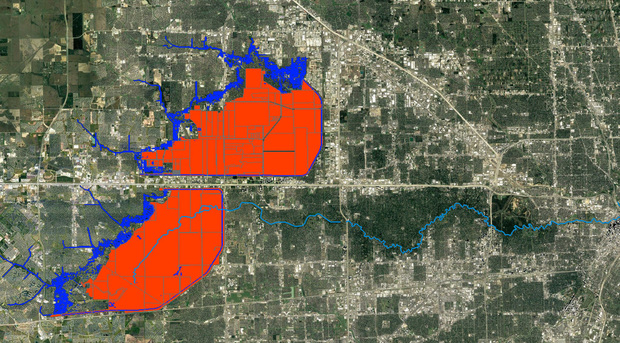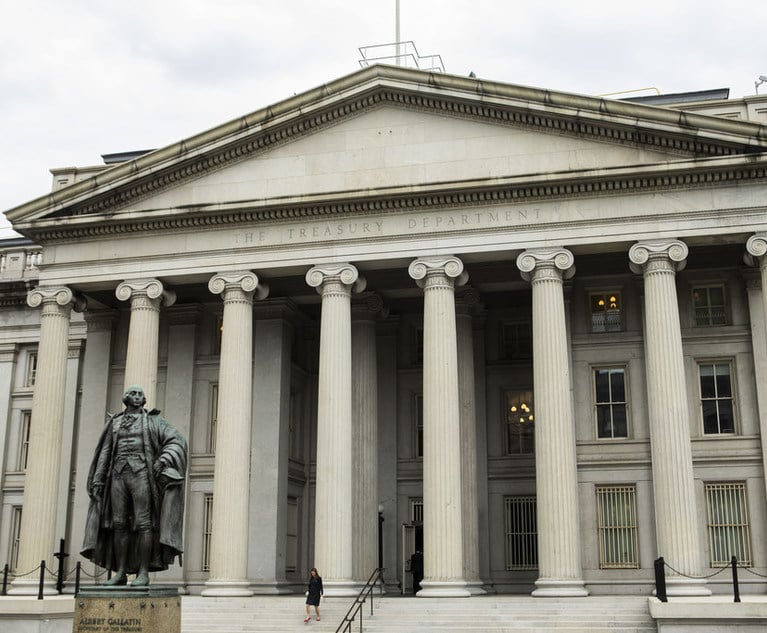Trial begins against government over Hurricane Harvey flooding
A big trial is set to begin May 6 in a case alleging the federal government designed two Houston-area reservoirs to flood a large area, where it knew…
May 03, 2019 at 12:00 AM
5 minute read
 Hurricane Harvey flooded the Addicks and Barker Reservoirs in Houston. The government owns the red potion and the blue portion is private property. Photo courtesy of Daniel Charest.
Hurricane Harvey flooded the Addicks and Barker Reservoirs in Houston. The government owns the red potion and the blue portion is private property. Photo courtesy of Daniel Charest.
A big trial is set to begin May 6 in a case alleging the federal government designed two Houston-area reservoirs to flood a large area, where it knew that many homes and businesses would be underwater in a major storm event — such as Hurricane Harvey in 2017.
On the third day of the 10-day trial, which ends May 17, the lawyers for the plaintiffs and the United States will hop on a bus with the judge, court reporter and others, to make a site visit to the areas where the 13 test plaintiffs alleged their properties and possessions were damaged when the government held Harvey stormwaters in the reservoirs, flooding at least 7,054 acres of private property without properly compensating the plaintiffs.
“Because so much of the testimony is going to be about what happened at the houses and seeing the actual impact on their homes and lives, the judge wants to be out there and experience it firsthand,” said Daniel Charest, managing partner in Burns Charest in Dallas, one of the plaintiffs' co-lead counsel.
 Daniel Charest, managing partner with Burns Charest.
Daniel Charest, managing partner with Burns Charest.U.S. Department of Justice spokesman Jeremy Edwards declined to comment.
“The Corps' actions constituted an exercise of governmental power to prevent loss of life and far worse damage to private property,” said a Feb. 1 pretrial memorandum in which the United States argued that its actions were not a taking of property.
In late August and early September 2017, Harvey drenched Houston with more than 30 inches of rain in five days. The government's memorandum said Harvey was the greatest single rainfall event in the nation's history, dumping an estimated 1 trillion gallons of water in the Houston area. The National Weather Service said it was a 1,000-year flood. More than 60,000 residents had to be rescued, 36 people died, an estimated 154,170 homes flooded and it caused an estimated $125 billion loss.
There are two federal flood control projects in West Houston called the Addicks and Barker reservoirs, according to the Jan. 16, 2018, master amended complaint in the case, In re Upstream Addicks and Barker Flood-Control Reservoirs, pending in the U.S. Court of Federal Claims. The design of the reservoirs includes a “maximum design pool” that's meant to flood during maximum storms. However, the government didn't own all the land in the pool; the rest is private property, and part of it flooded for 10 days as the government held stormwater in the reservoirs to protect downtown Houston, the complaint said.
It said the U.S. Army Corps of Engineers designed and built the reservoirs. Corps documents have said the government knew it didn't acquire enough land and an extreme storm could flood 8,900 acres of private land. The plaintiffs allege the government must compensate them for taking their property, and they seek to recover attorney fees, litigation expenses and court costs.
The government argued in its memorandum that the upstream plaintiffs' claims fail because their flooding resulted from a one-time and temporary event from the historical storm. It said the plaintiffs don't have a property interest to be free of floodwaters during a hurricane, and some of the test properties would have flooded even without government action.
When the reservoirs were constructed 70 years ago, the upstream land was used for ranching and rice farming. There's been significant development of residential subdivisions over the years.
“The upstream plaintiffs knew or should have known of the potential for upstream flooding years before Hurricane Harvey struck due to past storms, public documents, newspaper articles and public meetings,” the memorandum said, noting the Corps itself released reports and held meetings to warn about flood risk.
In this phase of the trial in the case, the 13 plaintiffs are arguing to prove that the government is liable. If they win, they will seek to certify a class of upstream property owners and proceed to a trial to determine damages.
On April 17, the Corps came under fire by U.S. senators for its handling of dams along the Missouri River in the wake of massive flooding that caused $3 billion in damage in the Midwest this spring, according to The Associated Press. In 2014, a group of 372 Midwestern plaintiffs sued the Corps over repeated Missouri River floods, according to St. Louis Public Radio, and in 2018, the U.S. Court of Federal Claims found the Corps was responsible for damage. Those plaintiffs are seeking damages over $300 million.
This content has been archived. It is available through our partners, LexisNexis® and Bloomberg Law.
To view this content, please continue to their sites.
Not a Lexis Subscriber?
Subscribe Now
Not a Bloomberg Law Subscriber?
Subscribe Now
NOT FOR REPRINT
© 2025 ALM Global, LLC, All Rights Reserved. Request academic re-use from www.copyright.com. All other uses, submit a request to [email protected]. For more information visit Asset & Logo Licensing.
You Might Like
View All
Supreme Court Reinstates Corporate Disclosure Law Pending Challenge



Supreme Court Considers Reviving Lawsuit Over Fatal Traffic Stop Shooting
Trending Stories
Who Got The Work
J. Brugh Lower of Gibbons has entered an appearance for industrial equipment supplier Devco Corporation in a pending trademark infringement lawsuit. The suit, accusing the defendant of selling knock-off Graco products, was filed Dec. 18 in New Jersey District Court by Rivkin Radler on behalf of Graco Inc. and Graco Minnesota. The case, assigned to U.S. District Judge Zahid N. Quraishi, is 3:24-cv-11294, Graco Inc. et al v. Devco Corporation.
Who Got The Work
Rebecca Maller-Stein and Kent A. Yalowitz of Arnold & Porter Kaye Scholer have entered their appearances for Hanaco Venture Capital and its executives, Lior Prosor and David Frankel, in a pending securities lawsuit. The action, filed on Dec. 24 in New York Southern District Court by Zell, Aron & Co. on behalf of Goldeneye Advisors, accuses the defendants of negligently and fraudulently managing the plaintiff's $1 million investment. The case, assigned to U.S. District Judge Vernon S. Broderick, is 1:24-cv-09918, Goldeneye Advisors, LLC v. Hanaco Venture Capital, Ltd. et al.
Who Got The Work
Attorneys from A&O Shearman has stepped in as defense counsel for Toronto-Dominion Bank and other defendants in a pending securities class action. The suit, filed Dec. 11 in New York Southern District Court by Bleichmar Fonti & Auld, accuses the defendants of concealing the bank's 'pervasive' deficiencies in regards to its compliance with the Bank Secrecy Act and the quality of its anti-money laundering controls. The case, assigned to U.S. District Judge Arun Subramanian, is 1:24-cv-09445, Gonzalez v. The Toronto-Dominion Bank et al.
Who Got The Work
Crown Castle International, a Pennsylvania company providing shared communications infrastructure, has turned to Luke D. Wolf of Gordon Rees Scully Mansukhani to fend off a pending breach-of-contract lawsuit. The court action, filed Nov. 25 in Michigan Eastern District Court by Hooper Hathaway PC on behalf of The Town Residences LLC, accuses Crown Castle of failing to transfer approximately $30,000 in utility payments from T-Mobile in breach of a roof-top lease and assignment agreement. The case, assigned to U.S. District Judge Susan K. Declercq, is 2:24-cv-13131, The Town Residences LLC v. T-Mobile US, Inc. et al.
Who Got The Work
Wilfred P. Coronato and Daniel M. Schwartz of McCarter & English have stepped in as defense counsel to Electrolux Home Products Inc. in a pending product liability lawsuit. The court action, filed Nov. 26 in New York Eastern District Court by Poulos Lopiccolo PC and Nagel Rice LLP on behalf of David Stern, alleges that the defendant's refrigerators’ drawers and shelving repeatedly break and fall apart within months after purchase. The case, assigned to U.S. District Judge Joan M. Azrack, is 2:24-cv-08204, Stern v. Electrolux Home Products, Inc.
Featured Firms
Law Offices of Gary Martin Hays & Associates, P.C.
(470) 294-1674
Law Offices of Mark E. Salomone
(857) 444-6468
Smith & Hassler
(713) 739-1250






